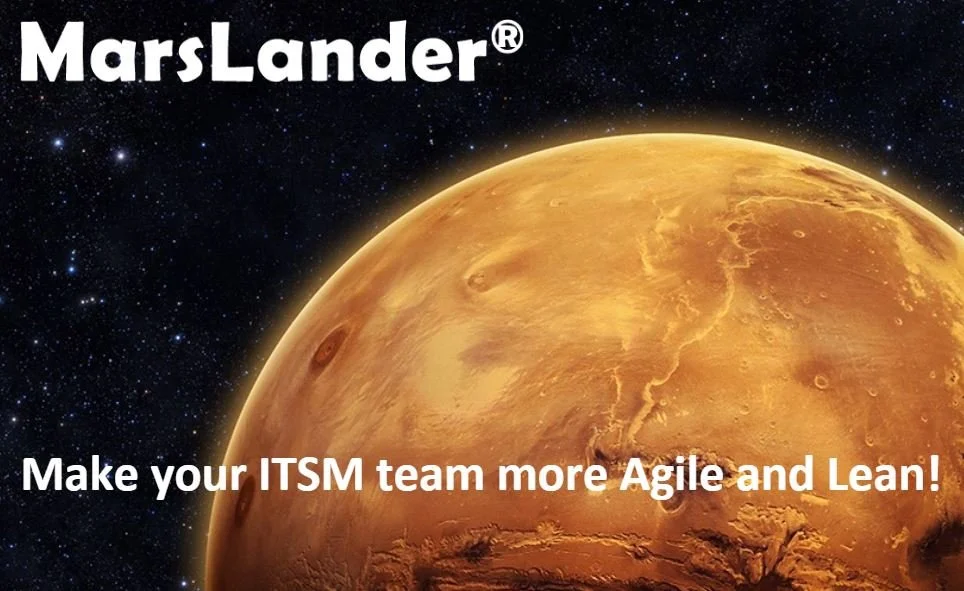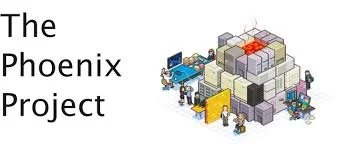The simulations
Gander Service Management is the sole Certified Delivery Partner for the MarsLander (ITIL4®) and The Phoenix Project (DevOps) simulations in New Zealand and will travel anywhere in APAC and UK / Europe to deliver to your teams.
People are often sent on training courses to gain knowledge of particular subjects. Usually, people are given the theory in traditional classroom courses or e-learning modules and are then left to gain the experience in a real-life, often mission-critical, environment, without guidance or support; then people complain that the best practice is no good, whereas a lot of the problems are associated with our inability to translate the theory into practice, and not understanding how to apply it.
A business simulation game is a form of experiential learning, or learning-by-doing. People learn, in several game rounds, to translate theory into practice. They learn how to use the theory to achieve measurable results.
Does this mean that they need to have attended a training course first? No, not at all. By attending a business simulation with no preconceptions of the theory of “how to do it”, people learn as much as those who have attended training. Sometimes more.
Are business simulation games only for IT? Again, no. Business simulation workshops like MarsLander or The Phoenix Project allow those from the wider business to experience what IT experiences and learn how to build a closer working relationship with IT in a “safe” environment where everyone can try and fail, or try and succeed, without a business impact.
The simulations can help create a dialogue and help employees better understand how to improve their way of working from where they are now towards a more Agile and Lean approach, not as a large implementation project but in small incremental steps and based on their motivation.
ITSM Simulation
MarsLander is the next generation of space technology. Bringing a MarsLander to Mars requires a higher level of ITSM capabilities. There is a lot more software involved and more stakeholders and customers whose experiences we must take into account and manage. To effectively manage the service delivery in this ‘digital age’ we need to be more Agile and Lean and we have to work as end-to-end teams, ensuring software, hardware and services are in sync and able to respond rapidly to changes and new requests.
To fulfil all the demands of the business and customers, IT Teams must deliver fast, reliable, safe, error-free solutions. The increasing demand for digital services means we must increase the flow of work. More and faster is the business demand. But an increase and demand and speed brings with it the risk of mistakes. An error in space cannot be readily fixed by sending an on-site engineer. Quality and manageability must be built in. New software can be deployed in real-time, at any time, as needed. The way we need to work on the MarsLander mission is new. We are learning as we go, to deal with things we have never experienced before. We need to be flexible and continuously learn and improve our services and capabilities in small steps to ensure we are continually aligned with customer needs. At the same time, we are increasingly dependent upon an ecosystem of partners and suppliers who must also be aligned and flexible to changing needs.
This new way of working has also brought about a demand for multifunctional teams, a need to share knowledge, reduce hand-offs, prevent miscommunication and ensure all are aligned to realising customer needs.
In this simulation, you will be ‘working’ in the digital service team of SPACE-Y, a company that sells data collected from their space missions to customers, such as Universities and Research Centres. Your team's mission is clear: “Launch a rocket with MarsLander onboard, deploy it on Mars and collect valuable data for Universities and Research Centres”.
There will be challenges, however. As a team, we will need to achieve the mission goals. The Sales Director has direct contact with the customers and will sign new contracts. The Product Owner will manage the backlog of work to ensure mission goals are achieved. The Customer Support team will support customer feedback and Flight Operations will manage the flight. The IT Team will make sure Issues and Events are solved according to the Service Agreement and new offerings are integrated into operations practices. Requests and Features must be built and released on time and Customer Feedback dealt with as fast as possible to guarantee high customer satisfaction scores. Application Development will build software to support new and changing business and customer demands, and at the same time will fix issues if they are related to software errors. This team will be supported by the Vendor who is delivering data storage and data support services. The Service Manager will manage the continual improvement activities and will make sure that new and existing services deliver the required value. We also have to address the fact that our capacity for work is partially blocked by “waste”. All of this while adhering to Change / Release Management.
Target Audience
This simulation is targeted at all roles and employees in IT Development and IT Operations who want to apply Lean, Agile and ITSM principles to improve the performance of their IT Services, understand how to prioritise work based on value or to create more value out of their IT Solutions.
The simulation can be used for:
Awareness programs
Assessment sessions
Team building
Duration
Full day (09:00 - 16:00)
Number of participants
8 - 12 (ideally 10)
Learning Outcomes
This simulation is about exploring and experiencing how you can transform your current IT organisation into a more Agile and Lean organisation. The following aspects will be experienced and discussed:
How can service teams help and how to create high-performing teams?
How can we visualise our work, using KanBan?
How can we prioritise our work based on value?
How can we increase the flow of work?
How do we work closer together with development?
How do we continuously improve our services?
How do we become a flexible service organisation that responds rapidly to changing demands?
How do we become more customer-focused, and develop this ‘customer thinking’ into our teams?
How do we effectively manage workload (end-to-end) and how to reduce unplanned work?
How do we increase customer and employee satisfaction?
DevOps / Agile Simulation
Parts Unlimited are in trouble. Newspaper reports reveal the poor financial performance of the organisation. The only way to save the company and to make it competitive and profitable is “The Phoenix Project” which is an IT-enabled business transformation, with Retail Operations as the business owner of this project.
The VP of IT Operations is asked to lead the IT Department and make sure “The Phoenix Project” is successful. However, he is facing a tremendous amount of work. Huge backlogs of issues, features and projects.
Your team will take different roles within Parts Unlimited. You can be Retail Operations, Human Resources or the CFO and run your projects. You can play the role of the VP of IT Operations, or lead one of the IT functions. You will be suggesting improvements, addressing issues, developing applications, managing operations or other members of the IT Team that need to develop the applications and solve the IT Issues.
Your challenge is to use the DevOps principles and apply them in this serious Business Simulation. In four rounds you will work on the IT Projects and IT Issues and make sure “The Phoenix Project” is finished on time. But, beware, the business keeps coming up with new ideas and demands, and external developments outside your control can also throw a spanner in the works.
Target Audience
This simulation is targeted at all roles and employees in Business, IT Development and IT Operations who want to apply Lean, Agile and ITSM principles to improve the performance of their IT Services or to create more value out of their IT Solutions. Non-IT business partners are encouraged to attend as feedback from other clients has demonstrated the value they experience from the simulation.
This simulation is for organisations who want to develop their culture to achieve better collaboration and as a result, faster and error-free deployment of new IT Solutions.
The simulation can be used for:
Awareness programs
Assessment sessions
Team building
Duration
Full day (09:00 - 16:00)
Number of participants
10 - 12
Learning Outcomes
This simulation is about exploring and experiencing how you can transform your current IT organisation into a more Agile and Lean organisation. The following aspects will be experienced and discussed:
How can we apply DevOps principles in a real-life situation?
How can we find the right balance between delivering SLA requirements and IT Projects according to plan?
How can we visualise work effectively?
How can we experience how DevOps/agile ways of working can bring serious value to the business?
How can we increase the efficiency and effectiveness of the IT Department?
How can we create better flow in the teams?
How can we develop people’s skills to act in a more agile/DevOps style environment?
How can we show the wider business their responsibilities in making IT Projects more successful?


